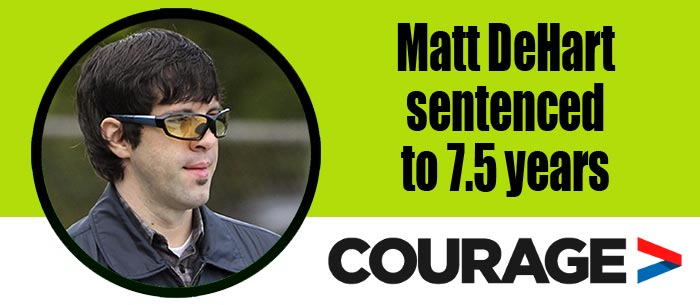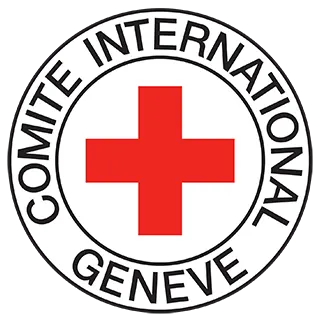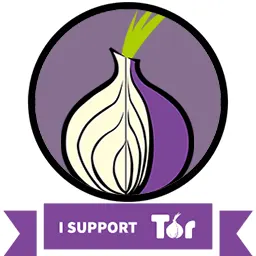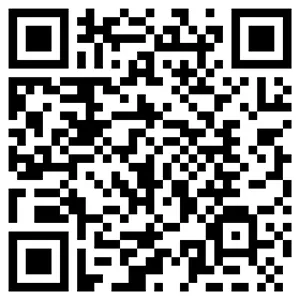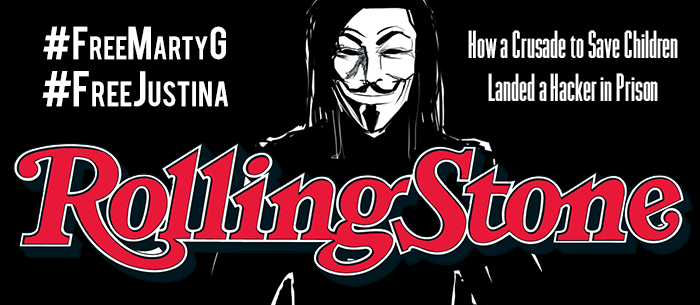
Home Anonymous Operations The Anonymous Solidarity Network Rolling Stone - Marty Gottesfeld
Thursday 27 July 2017
When a programmer shut down a hospital website to defend a sick girl, he raised a crucial question:
What are the bounds of protest in the digital age? If convicted, Martin Gottesfeld could face up to 15 years in prison and $500,000 in fines.
One afternoon in a modest, hilltop home in West Hartford, Connecticut, Linda Pelletier, a sandy-blond mother of four, opened a greeting card from her 15-year-old daughter, Justina. To her surprise, a small, intricately folded piece of paper slipped out from inside. It was an origami fortune teller. Pelletier poked her thumbs and forefingers under the flaps, spread them apart, then unfolded the flap that faced her. A chill shot through her as she read the message, written as tiny as her daughter’s handwriting would allow: "I’m being tortured."
Six months earlier, Justina, a spunky petite brunette, seemed like any other middle-class, suburban girl. She collected stuffed giraffes, listened to Taylor Swift and ice skated competitively, coached by her mom, a champion skater in her own right. But then she began feeling unusually sick. She developed searing stomach pains and confounding digestive problems. It got so bad her parents took her to see Dr. Mark Korson, a metabolic geneticist then at the Tufts Medical Center. He had given her a working diagnosis of mitochondrial disease, a chronic genetic disorder that can cause weakened muscles, neurological problems and dementia.
Soon after, in February 2013, Justina’s symptoms became too much too bear, as her stomach felt like it was ripping apart. Desperate and scared, her parents rushed her through a blizzard to the best hospital in reach, Boston Children’s, the renowned teaching facility associated with Harvard. By the time she arrived, she was slurring her speech and barely able to swallow food.
But the doctors at Children’s gave Linda and Lou a shockingly different diagnosis than the one she’d received at Tufts: Justina didn’t have mitochondrial disease; her illness, they said, was in her head. The hospital told them that they were taking Justina off her mitochondrial and pain medication. Confused and reeling, the parents refused to comply. And when they attempted to check Justina out of the hospital, they were blocked by security guards. The state was taking emergency custody of their daughter under suspicions of what they called "medical child abuse" at the hands of the parents. "We didn’t even get a chance to say goodbye," Lou later said.
Transferred to Bader 5, the hospital’s psych ward, Justina’s condition rapidly declined.
She could barely walk or speak anymore, and felt like she had knives in her stomach. But the treatment she claims she endured was the most devastating of all. "I was getting worse and they didn’t believe me that I was in pain," Justina tells me. According to a lawsuit the Pelletiers later filed against Boston Children’s, Justina was left in hallways and in bathrooms for hours at a time. When forced to walk, she would fall at times "and they would laugh at me," she says. Her toenails were ripped out, she alleged in the lawsuit, when they pulled her in a wheelchair and her feet dragged on the floor.
Even more frightening, she was too afraid to tell her parents any of this. Their communications – limited to one 20-minute call and one hour-long visit each week – were closely monitored by hospital staff, and she worried about what might happen to her parents or her if they overheard her. Instead, she resorted to sneaking notes, such as the one hidden in the origami, to her family. After the Pelletiers began speaking out publicly about their daughter on social media and to local news, a judge ordered the family put under a gag order. "I couldn’t talk to anybody," Justina recalls.
To the Pelletiers and their supporters, Justina had been "kidnapped," as her father Lou put it, by the state of Massachusetts for the sake of medical experimentation. Korson, the Tufts doctor who had given Justina her original diagnosis, wrote a scathing letter to the Pelletier’s attorney on their behalf calling Children’s actions "the most severe and intrusive intervention a patient can undergo…it feels like Justina’s treatment team is out to prove the diagnosis at all costs."
But, according to the state, it was the parents who were the real danger.
The Department of Children and Families (DCF) and Boston Children’s refuted the allegations against them. They were protecting Justina from parents who were, as one Children’s physician put it, "overmedicalizing" the girl and neglecting to give her the psychiatric treatment she needed. Taking custody was in the child’s best interest, the hospital contended in a statement at the time, because of "both parents’ resistance towards recommended treatment plans." Children’s spokesperson Rob Graham tells me Justina’s "treatment by each of Boston Children’s providers was proper; their care fell squarely within the appropriate professional standards of care, and resulted in patient improvement."
However, a December 2013 in-depth investigation of Justina’s case by the Boston Globe found that, in the previous 18 months, Children’s had "been involved in at least five cases where a disputed medical diagnosis led to parents either losing custody or being threatened with that extreme measure." There was even a nickname for such custody battles, which occurred at other hospitals as well: "parentectomy." The Globe, in a wider investigation into the DCF, found more disturbing data. More than 95 children were found to have died in state custody between 2001 and 2010.
To get help with Justina, the Pelletiers reached out to Reverend Patrick Mahoney, director of the Christian Defense Coalition, a group who had rallied around keeping Terri Schiavo alive during her controversial right-to-die case. Mahoney believed that the "government was overstepping their boundaries into personal individual freedom." As the Pelletiers’ spokesperson, he transformed their fight into an online campaign, soliciting volunteers to help spread the word.
As publicity surrounding Justina’s case reached its height, Martin Gottesfeld, a 30-year-old computer security expert who had no relation to Justina or her family, decided to act – during one of the hospital’s biggest fundraising periods of the year. According to the indictment from the U.S. District Court of Massachusetts, Gottesfeld attacked the computer servers of Children’s and the nearby Wayside Youth and Family Support Network, the residential treatment facility where Justina was moved after Bader 5. Though no patients’ records were compromised or harmed, the hospital claimed the attack, which lasted several days and temporarily downed the website, "disrupted day-to-day operations as well as research being done." Children’s claimed the attack cost $300,000 to mitigate, and resulted in another $300,000 in losses due to the hospital’s donation website being shut down.
But the attack largely achieved Gottesfeld’s intended effect:
It put the institution overseeing her care on the defense and raised awareness of Justina’s story. The feat also landed Gottesfeld behind bars. He is currently awaiting trial inside a federal detention center in Plymouth, Massachusetts, charged with conspiracy and intentional damage to a protected computer, under the Computer Fraud and Abuse Act, or CFAA, a law written during the Reagan administration to protect government computers from "unauthorized access."
The CFAA faces widespread criticism for being both outdated and overzealously applied.
Most notably, this happened in the case of activist Aaron Swartz, the Harvard research fellow who was charged with illegally downloading several million journal articles from the online academic database JSTOR, which he reportedly intended to make openly available to the public. Though Swartz was fighting for freedom of information, U.S. Attorney Carmen Ortiz famously declared "stealing is stealing," charging him under the CFAA with felony counts that carried a maximum sentence of 35 years and potential fines of $1 million. Refusing to take a plea, Swartz committed suicide in January 2013.
If convicted, Gottesfeld could face up to 15 years in prison and $500,000 in fines.
His case, currently awaiting a trial date, has launched its own campaign and hashtag #FreeMartyG. And it’s raising an increasingly crucial question: What are the bounds of protest in the digital age?
As Gottesfeld awaits the answer that will determine his fate, I visit him on an overcast day in March. Stocky, dark-haired, in a green prison jumpsuit, his eyes redden as he clutches his black phone on the other side of the Plexiglas barrier. "I don’t want any activist to go through what I went through for trying to do the right fucking thing," he says.
"Any of my fellow Bostonians down for a protest?"
It was the wee hours of December 24th, 2013, when Gottesfeld fired off this Facebook message, linking to a sensationalized article he’d found on the depths of the Internet. He was inside his darkened, ground floor apartment decorated with framed classic rock album covers – hammering at his laptop from his sagging, L-shaped, gingham couch. He couldn’t believe what he’d just read on Facebook about Justina Pelletier. When a Facebook friend limply replied about how "messed up" the world had become, Gottesfeld stiffened his back. "They only win if we give up," he typed back.
Born Martin Karim and raised in Andover, Massachusetts, Gottesfeld is a victim of abuse himself. At age 12 – having never met his Bangladeshi father and after his mother had a nervous breakdown – his maternal grandparents, Jay and Gloria Gottesfeld, agreed to adopt him. His grandfather, a computer engineer, resented the arrangement – "I felt unwanted, like I was a burden," Marty tells me. At times, Jay would lash out physically and emotionally. Gloria confirms his account. "It’s true, unfortunately," she says.
But, Marty adds, his grandfather (whom he calls his father) was abused as a child at an orphanage. "He’s a survivor of institutionalized child abuse," Gottesfeld says. "I’m a survivor of child abuse." The point being, he adds, "I take child abuse really seriously." Gloria recalls him frequently coming to the aid of the less fortunate, including a time when, as a young boy, he attacked a teenager who had portrayed a bully in a school play, thinking he was the real thing.
Around 1996, after getting access to a computer at his grandparents’ home, Gottesfeld felt a new sense of purpose. Soon, he was writing and selling his own utility software. His technical skills and grades got him into the esteemed boarding school Exeter, where he found like-minded peers, including a teenage Mark Zuckerberg. "We hung out in a common crowd since we were both computer kids," Marty says. They shared what he calls "this intrinsic drive to just always code, code, code, code and code some more." (A spokesperson for Zuckerberg confirms that the two were classmates, but says they haven’t had contact since Exeter.) After Gottesfeld got into trouble for exploring vulnerabilities in the school’s computer system, he dropped out and went into computer consulting.
On the side, Gottesfeld maintained a budding passion for human rights causes,
supporting Amnesty International and Human Rights Watch. But it wasn’t until he started dating Dana Barach – a thoughtful Brandeis student with wavy long red hair whom he met online – that he found a way to fuse his worldview with his programming skills.
In July 2013, Barach visited her 16-year-old brother at the Logan River Academy, a so-called "troubled teen" facility in Utah where he’d been living since February. Dana’s parents had sent him there for the typical reasons: he was smoking pot, playing guitar late into the night and failing at school. Dana returned from Utah with allegations of gross mistreatment that struck a nerve with Gottesfeld. He says he called the Utah police, Human Rights Watch, even the FBI, but to no avail. "I was pretty much roundly and flatly ignored," he says. But after posting about Logan River on Facebook, he got a message from someone claiming to be part of the hacker collective Anonymous: "Would you like some help?"
Gottesfeld had never interacted with Anonymous, and only knew of its "mystique," as he puts it.
By 2013, the decentralized group had become notorious for international campaigns against targets from the Church of Scientology to Middle Eastern dictators during the Arab Spring. But the Anonymous hacker (whose name Gottesfeld does not want to reveal) told Gottesfeld that he had also been fighting to liberate kids from troubled-teen centers, and that he himself had suffered a brain injury while residing at one. If Gottesfeld needed media attention on the problems at Logan River, the hacker told him, then Anonymous could deliver. "We’ll take any help we can get," Gottesfeld replied.
— David Kushner : rollingstone.com



